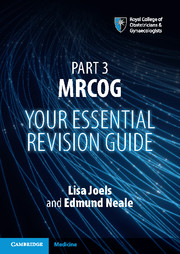Book contents
- Frontmatter
- Contents
- Foreword
- 1 The Part 3 Clinical Assessment in the Context of the MRCOG Examination
- 2 Core Clinical Skills
- 3 The Modules of the Curriculum Assessed in the Part 3 Exam
- 4 Tips for Candidates
- 5 Practice Tasks with Videos
- 6 Revision Resources
- Appendix 1 Part 3 MRCOG Clinical Skills Assessment Template
- Index
- References
2 - Core Clinical Skills
Published online by Cambridge University Press: 05 September 2016
- Frontmatter
- Contents
- Foreword
- 1 The Part 3 Clinical Assessment in the Context of the MRCOG Examination
- 2 Core Clinical Skills
- 3 The Modules of the Curriculum Assessed in the Part 3 Exam
- 4 Tips for Candidates
- 5 Practice Tasks with Videos
- 6 Revision Resources
- Appendix 1 Part 3 MRCOG Clinical Skills Assessment Template
- Index
- References
Summary
In order to practise safe obstetrics and gynaecology as a senior trainee and ultimately as an independent practitioner, it is essential to have a thorough and comprehensive understanding of obstetrics and gynaecology, including the evidence base underpinning this knowledge. The MRCOG examination has consistently been shown to be an excellent assessment of the knowledge required to move from core to higher training. The knowledge that will be assessed by the MRCOG examination is clearly defined in the MRCOG curriculum and has not changed despite alterations in the structure of the exam.
There is much more to the practice of clinical medicine than being really clever and having a comprehensive knowledge of anatomy, physiology and pathology. The practice of clinical medicine requires an understanding of how to apply clinical knowledge to an individual patient and, in modern medicine, also requires a patient-centred approach. The General Medical Council (GMC) has identified that deficiencies in pure knowledge are seldom the reason for patients’ complaints or referral to the GMC's fitness-to-practice panel. Therefore this demonstrates that becoming a senior medical practitioner is about more than pure acquisition of knowledge. It includes being able to apply those core clinical skills, competencies and attitudes to each individual patient in a framework based on safety and team working. These additional skills are defined in the curriculum and are assessed by a combination of workplace-based assessments and the MRCOG examination. The Part 1 and Part 2 MRCOG exams have been shown to be robust assessments of core and applied clinical knowledge.
The Part 3 MRCOG exam tests those same core clinical skills in the context of a patient-centred knowledge and skills framework to ensure that passing candidates have the necessary skills to move to higher training and independent practice. Throughout the Part 3 exam, the clinical and lay examiners are asked to identify the ‘competent candidate’ and they are given detailed descriptions about the skills that a competent candidate would be expected to demonstrate. The importance of understanding this is that they aren't looking for a ‘good’ or ‘excellent’ candidate and the passing standard isn't set at an unreasonable level.
- Type
- Chapter
- Information
- Part 3 MRCOGYour Essential Revision Guide, pp. 10 - 29Publisher: Cambridge University PressPrint publication year: 2016

